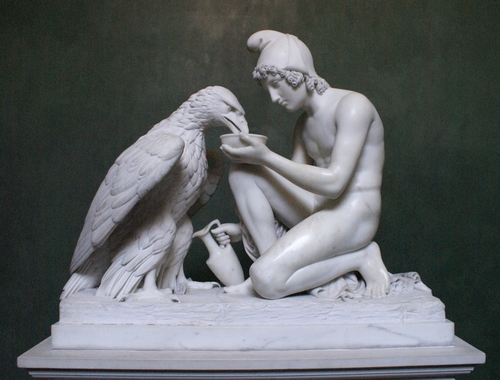
the gods caught him away to themselves, to be Zeus' winepourer,
for the sake of his beauty, so he might be among the immortals.
(Iliad, Book XX, lines 233-235)
We really don't know how Ganymede reacted to the abduction, maybe after knowing who the eagle was and where he had been taken he felt happy because he was chosen by the gods. Paintings and sculptures often represent him embraced by the eagle, half surprised, half scared, or as cup-bearer, serving the drinks to Zeus. If we consider that the capricious, changeable god conceded Ganymede the gift of immortality (so as he remained young forever), which was a very special distinction, and gave him a place in the constellation Aquarius, and in a context where humans used to suffer a terrible destiny, we could think that Ganimede was lucky; That's why I chose to illustrate the post Bertel Thorvaldsen's sculpture, where Zeus, the eagle, drinks from the cup that the boy offers him.
Among more recent literary references, there is the poem by Goethe, written in 1774. It tells us about the boy at the time of the abduction, eager to unite the god. Honestly, it's not easy to realise nowadays, when we aren't experts in mythology anymore, that the verses talk about Ganymede; we need a previous knowledge of his story (and knowing that the poem is entitled Ganymed is really useful!). Goethe's poem begins with a praise of spring, that eventually becomes something or someone that you can embrace (Dass ich dich fassen möcht' in diesen Arm!, Would that I could clasp you in these arms!); At the end of the poem, it's easy to imagine him "embracing and embraced" to the eagle, as the poem explicitly says: umfangend, umfangen, both flying over the clouds.
And since we are talking about Goethe, if you have a copy of The Sorrows of Young Werther, maybe you would like to read the second letter, that of May 10th; we find there some reflections very similar to those of Ganymed. It's not that nobody abducts Werther, of course, but the young man feels in communion with nature on a spring morning, and he even makes a reference to the Alliebender, "the breath of all love" according to R.D. Boylan's translation, as the poem does:
Wie im Morgenglanze
Du rings mich anglühst,
Frühling, Geliebter!
Mit tausendfacher Liebeswonne
Sich an mein Herze drängt
Deiner ewigen Wärme
Heilig Gefühl,
Unendliche Schöne!
Dass ich dich fassen möcht’
In diesen Arm!
Ach, an deinem Busen
Lieg’ ich und schmachte,
Und deine Blumen, dein Gras
Drängen sich an mein Herz.
Du kühlst den brennenden
Durst meines Busens,
Lieblicher Morgenwind!
Ruft drein die Nachtigall
Liebend mach mir aus dem Nebeltal.
Ich komm’, ich komme!
Ach wohin, wohin?
Hinauf! strebt’s hinauf!
Es schweben die Wolken
Abwärts, die Wolken
Neigen sich der sehnenden Liebe.
Mir! Mir!
In eurem Schosse
Aufwärts!
Umfangend umfangen!
Aufwärts an deinen Busen,
Alliebender Vater!
How in the morning light
you glow around me,
beloved Spring!
With love's thousand-fold bliss,
to my heart presses
the eternal warmth
of sacred feelings
and endless beauty!
Would that I could clasp
you in these arms!
Ah, at your breast
I lie and languish,
and your flowers and your grass
press themselves to my heart.
You cool the burning
thirst of my breast,
lovely morning wind!
The nightingale calls
lovingly to me from the misty vale.
I am coming, I am coming!
but whither? To where?
Upwards I strive, upwards!
The clouds float
downwards, the clouds
bow down to yearning love.
To me! To me!
In your lap
upwards!
Embracing, embraced!
Upwards to your bosom,
All-loving Father!
(translation by Emily Ezust)













Comments powered by CComment